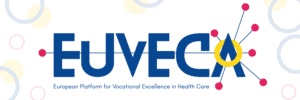An article by Anita Bjørsvik Kvamme
Decentralised simulation training for professionals – and students in the community health and care services have been pointed out as particularly interesting from different levels of health care education, and health care services in the region. The Norwegian EUVECA project group, therefore, organised a seminar with representatives of the future Regional Vocational Excellence Hub (RVEH).
On the one hand, the aim was to give information and knowledge about simulation as a pedagogical method for competence development and on the other hand to get input on how we can use decentralised simulation to develop competence among professionals in the community health and care sector in the region.
On the 20th of June 2023, the Norwegian EUVECA project group organised a seminar on simulation training for competence development in the community health and care sector. The seminar was held in the Region Nordhordland Health Centre, where the Norwegian RVEH will be set up. Participants represented local authorities, governments, providers, professionals, associations, and different levels of healthcare education.
The purpose of the seminar was to:
- Give information and knowledge about simulation as a pedagogical method for competence development in the health and care sector.
- Get input on how to use decentralised simulation to develop competence among professionals in the community health and care sector in the region.
The seminar was opened by Karstein Totland, leader of the Nordhordland Regional Council and mayor of Masfjorden municipality. Thereafter representatives from the Norwegian EUVECA partners gave a brief introduction to the EUVECA project, followed by the presentation of simulation as a pedagogical method in health education, and experiences with simulation and the program around systematic simulation training, RegSim, at the regional hospital. We were also lucky to have Uroš Zafošnik, head of the Simulation Centre at the Health Community Centre in Ljubljana, Slovenia with us, who is an EUVECA partner and shared experiences from the use of mobile devices for simulation in the community health services around Ljubljana.
The discussions showed that simulation will be relevant for several community health and care services in the region. Collaboration with educational institutions was highlighted as important, as well as commitment and support from leaders. The exchange also showed that it is crucial to create a safe environment for simulation training. The participants were positive about a pilot project for decentralised simulation in the region – which is a good outcome regarding the aim of the EUVECA project – ensuring the provision of future-oriented skills within the sector.


